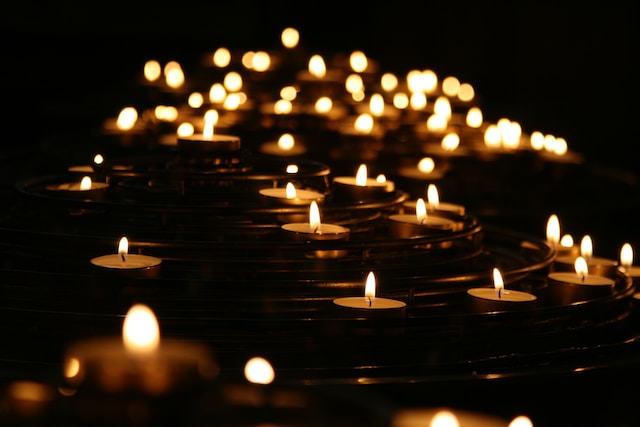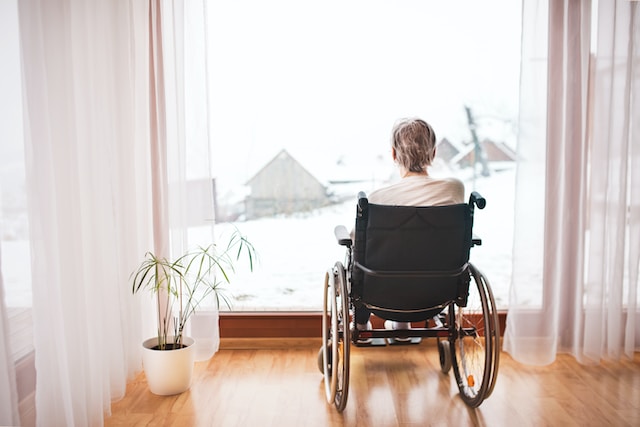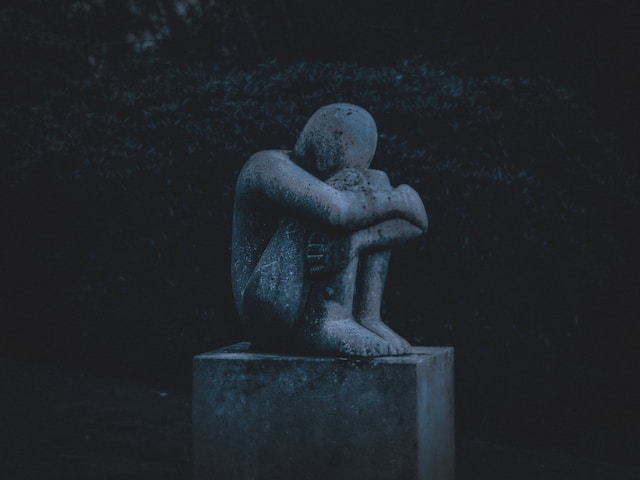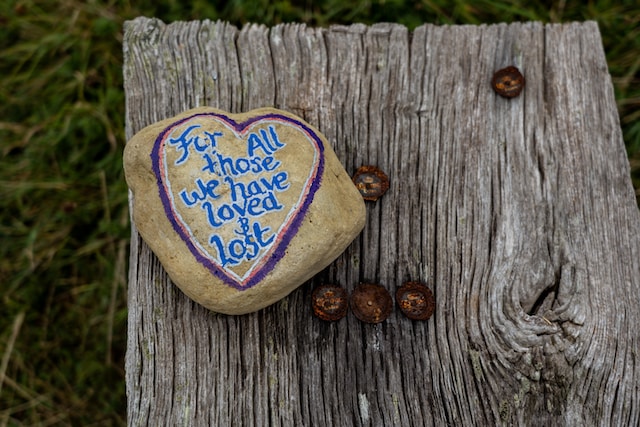The Depth of Grief
Some listeners may be triggered by this content and listener discretion is advised.
Grief and loss are inevitable parts of life and they can be challenging to navigate. Grief can feel overwhelming and isolating, whether it be the death of a loved one, a job, or a marriage. Recovering from grief and loss takes time, compassion, and self-care.
My guest on the podcast this week was Dr. Heather Browne, a psychotherapist and mother for 25 years. She loves both roles deeply. She is excellent at helping people change sticky thought processes and see the other side of challenging situations.
Her specialties are couples communication and intimacy, grief and loss, spirituality and faith, and transforming lives into expressions of beauty and joy.
There is no stuck. We just see it that way. Changing our perspective changes our experience. Dr. Heather is incredibly grateful for her sharp mind, fast wit, and massive amount of energy and light. She is here to show you that you can lighten and enlighten your load. Or just dump it. She uses metaphor, storytelling, imagery, and humor in her work.
“Grief is the price we pay for love.”
- Queen Elizabeth II
This post will look at the various sorts of loss, common ways we grieve, and how grief and loss can affect our physical and mental health. We'll also talk about ways to cope, where to get help, and how to find healing, hope and joy for the future. Loss and grief can be one of the most difficult things we ever face. But healing can be possible with time and support.
What Is Grief?
Grief is a natural reaction to loss involving emotional, psychological, and physical responses. Everyone will feel grief at some point because it is a universal human experience. Loss can manifest itself in various ways, including the death of a loved one, divorce or separation, job loss, or a dramatic change in circumstances.
Grief is a complex and unique process that no two people go through in the same manner. It can cause a wide range of emotions, including sadness, anger, guilt, and loneliness, as well as physical symptoms such as fatigue, headaches, and changes in appetite.

Grief intensity and duration can also vary greatly, with some people experiencing severe loss for short periods and others experiencing prolonged and difficult sadness.
It is important to remember that sorrow is a natural and necessary process that allows us to accept our loss and eventually move through it. Grief is frequently described as a journey with distinct stages and milestones. Just keep in mind that we all grieve differently. Some people may never experience all stages and we usually won't experience them in a set order. Grief can be fluid and some days you feel better and some days like you have taken a few steps back. Be gentle with yourself.
Stages of Grief
The stages of grief are a generally accepted paradigm for understanding the grieving process. While it's important to realize that not everyone will go through all phases or in the same order, this framework can be a helpful guide for navigating the grieving experience.
The following are the most frequently recognized stages of grief:
Denial: This stage is characterized by shock and disbelief at a loss and a refusal to accept its reality.
Anger: As the reality of the loss sinks in, many people get enraged, which can manifest as frustration, resentment, or even rage.
Bargaining: During this stage, people may try to bargain with higher powers or negotiate their way out of a loss.
Depression: Seeing the full extent of the loss can result in great sadness, thoughts of hopelessness, and a loss of interest in daily activities.
Acceptance: This final stage entails coming to terms with the reality of the loss and moving on with life.

While these stages are not necessarily experienced linearly or sequentially, they provide a valuable framework for understanding the grieving process. We can better understand our emotions and reactions and find solutions to manage them by knowing where we are. Understanding that grief is a normal process can also assist us in being more patient and compassionate with ourselves as we go through this difficult time.
Healing Through Grief
Healing from grief and loss is necessary for a variety of reasons. Grief has a significant impact on both our emotional and physical health, as well as our general quality of life. When neglected, sorrow can result in persistent stress, sadness, worry, and physical symptoms such as headaches, exhaustion, and appetite problems. We can improve our general health and wellbeing by attempting to heal through our grief.
Unresolved grief can have an influence on our relationships as well as our ability to participate in life. We may withdraw from social activities and struggle to find joy in everyday situations when we are consumed by grief. Grief healing can assist us in regaining our sense of purpose and reconnecting with the people and activities that are most important to us.

Healing is also essential because it helps us recognize and celebrate the life of the person or thing we have lost. We can create a meaningful and lasting legacy that honors the memory of our loved one or the aspect of our lives that we have lost by experiencing and working through our grief.
While the healing process can be challenging and exhausting, it is necessary for moving forward and finding peace and closure. We can emerge stronger, more resilient, and more equipped to face life's problems if we take the time to accept our grief and work through it healthily and constructively.
Understanding Loss and Grief
Loss can manifest itself in many different ways, each with its own challenges. Not all loss means losing someone or something through death. Loss can be a profound experience with any different causes.
Death of a loved one: One of the most prevalent and profound losses is the death of a family member, friend, or pet. It can cause deep pain, grief, and loss and might take a long time to process.
Divorce or separation: Terminating a significant relationship can sometimes result in painful feelings of loss, especially if the connection is long-term or emotionally meaningful.
Work loss: Losing a job can be devastating, primarily if it provides a source of income, stability, and identity.
Health-related losses: As people adjust to their new circumstances, they may experience feelings of loss and grief due to chronic disease, disability, or the loss of physical capacities.

Other life transitions, such as moving, retiring, or being an empty nester, can also cause a sense of loss as we adjust to new habits and ways of life.
While the grieving experience may be similar across different types of loss, each loss brings its own set of challenges. Grieving the death of a loved one, for example, may entail coping with legal and financial difficulties, but mourning the end of a meaningful relationship may entail negotiating complex emotional dynamics and shifting social networks.
Reacting to Grief and Loss
Grief and loss can cause a variety of emotional, physical, and behavioral responses. While everyone's grief experience is unique, there are some emotions that may be more common.
Emotions such as deep grief, rage, guilt, or regret are very common. Grief can elicit a wide range of complicated emotions, ranging from profound sadness to anger or annoyance at the loss.
Physical symptoms: Grief can impact the body, including fatigue, headaches, changes in appetite, and sleep difficulties.
Numbness or detachment: As a way of coping with the powerful emotions of loss, some people may experience a sensation of detachment or numbness.
Trouble concentrating or making decisions: The emotional toll of grieving can make it difficult to focus or make decisions, resulting in feelings of overwhelm and frustration.
Grief can also cause behavioral changes such as withdrawing from social activities, feeling unmotivated or bored with hobbies, or participating in risky behaviors.

Remembering that these feelings are entirely normal and natural during the grieving process is crucial. While they can be painful and overwhelming, they are essential to processing loss. We can better cope with our emotions and discover solutions to heal and move forward by acknowledging and accepting these feelings. Help from friends or family can also be a great support during the healing journey.
How Grief Impacts Mental Health
Grief and loss can have severe consequences for both physical and mental health. Grief's emotional toll can result in a variety of physical symptoms.
Fatigue: As the emotional and psychological strains of the grieving process take a physical toll on the body, grief can produce acute exhaustion.
Grief can cause changes in eating patterns, such as loss of appetite, overeating, or changes in food choices.
Sleep disturbances: Grief can affect sleep patterns by causing difficulties falling or staying asleep, nightmares, or insomnia.
Grief's emotional and psychological stress can result in physical symptoms such as headaches, muscle tightness, or stomach pain.
In addition to physical symptoms, grief can also have a significant influence on mental health.
Grief can cause sadness, hopelessness, and despair, which can develop into severe depression.

Anxiety: Sorrow can produce feelings of concern, fear, or panic, leading to anxiety and other problems.
Post-traumatic stress disorder (PTSD): When a loss is painful or unexpected, sorrow can trigger PTSD symptoms such as flashbacks or nightmares.
Complex grief: For some people, grief can become more difficult or extended, resulting in complicated grief. This can include deep and long-lasting sentiments of sadness, anger, or guilt that do not fade with time.
It is critical to understand the impact of sorrow on physical and mental health and to seek help if necessary. Joining a grief support group or talking with loved ones can be a step forward, if you feel safe to do so.
Managing Loss and Grief
Managing grief and loss is a complex process that can have physical and mental consequences. Having skills and tools to help you manage your emotions and navigate the grieving process is critical. Self-care habits such as exercise, writing, and mindfulness techniques are vital to coping with sorrow and loss.
Exercise can help you manage physical symptoms and improve mood. Journaling can help you process your feelings and gain perspective. Mindfulness and meditation techniques can help you create a sense of calm and inner peace, which can help with stress and anxiety management.
Seeking help from friends, family, or mental health experts can also create a safe environment to express emotions in and get the support you need on your healing journey. It is important to learn which techniques work best for you and make you feel safe. Be gentle and patient with yourself and understand that grieving is not a linear journey.
Taking the Next Step
When experiencing sadness and loss, it can be tough to find ways that allow you to heal. Healing means accepting the reality of your loss, finding meaning in the experience, and establishing a new sense of normalcy. Acknowledging the reality of your loss may entail allowing yourself to feel emotions like sadness or anger, which can be a challenging but necessary step toward healing. Accepting the reality of the loss also requires acknowledging that life will never be the same again. This might be a complicated reality, but accepting that the loss has profoundly affected your life is critical.

Discovering meaning in loss can help you make sense of your experiences and rediscover your purpose in life. Making small changes to get used to the new normal may mean asking for help from loved ones, developing new habits or goals, and practicing self-care. Turning your pain into something constructive is another approach to finding meaning in your loss. Examples of this are starting a charity in remembrance of a loved one, volunteering, or pursuing a new career that resonates with your values and beliefs.
Having hope and joy for the future can help you go on and rediscover your purpose in life. In some cases this could include focusing on the good things in life, connecting with others, and practicing gratitude and mindfulness. You can honor the memory of who or what has been lost while looking forward to new experiences and finding ways to gently move ahead.
Developing a New Normal
Changing your life to adjust to the new reality following a loss creates a new normal. However, this can be the most difficult part because it means letting go of the past and embracing a new way of life. This could almost feel like “forgetting” who or what you lost, even though that is not the case at all.

Identifying what needs to change is crucial to building a new normal. This may mean making tangible changes, like moving to a new house or finding a new career, or emotional changes, such as letting go of prior expectations or learning to live without someone or something previously present.
Focusing on self-care and self-compassion is another crucial part of developing a new normal. Creating new habits, emphasizing self-care practices such as exercise or therapy, and discovering healthy ways to cope with emotions are all part of this. Please be kind to yourself during this process and recognize that it is absolutely normal to need time to adjust to the new normal.
The Takeaway
Grief and loss are complex processes that can profoundly affect every area of your life. With the help of tools, techniques, and your support network, it is possible to manage the overwhelming emotions and progress toward healing. Accepting the reality of your loss, finding meaning in the loss, and establishing a new sense of normalcy are all critical aspects of the healing process.
And I cannot emphasize enough how important it is to seek help from friends and family, and engage in self-care activities such as exercise, writing, and mindfulness practices. You can move forward and find purpose and joy in life again by creating a sense of hope for the future. Please remember that grief is a normal process that requires time and patience. Your grief is unique to you and might look very different from other peoples’ grief.

Healing from grief and loss might take longer than expected and it is not linear. There may be moments when it feels like you are doing better, only to have a setback or overwhelming emotions reemerge when you get triggered or reminded by something.
Taking care of your physical, mental, and emotional wellbeing when you are grieving is more important than any other time.
Maybe you can spend some time in nature, practice mindfulness and meditation, or journal. And connect with your loved ones. Grief can make you feel very lonely and isolated and a helping hand can make a big difference.
Remember that there is no right or wrong way to grieve, and everyone's healing journey is unique. It is also critical to acknowledge that recovery is a possibility. Despite the fact that it might be a difficult and painful journey, it is possible to learn to live with a new normal and find hope and joy in the future.
Loss will always be a part of life, so healing from grief and loss is about finding a way to live with the loss rather than forgetting or moving on from it.
